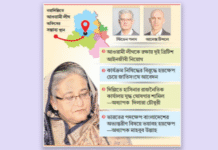
When Covid-19 infections and deaths were rising in mid-June, about 16,000 people used to get tested every day at the 49 laboratories.
As the number of labs rose to 66 by the end of June, more than 18,000 people got tested for coronavirus each day.
Six months down the line, the number of testing facilities is now 137, but the daily tests have dropped.

A total of 13,191 samples were tested on Thursday, even though the detection rate and death rate have been on the rise since the advent of winter.
Experts and officials of the health directorate said people’s growing unwillingness to get tested was the main reason behind such a poor number of tests. They blamed the government’s slack awareness campaign for this.
He also said the asymptomatic cases were another reason why fewer people were willing to get tested. Individuals who have contracted the virus but do have any symptoms are called asymptomatic cases.
Currently, Covid-19 tests are now being done at RT-PCR labs in 112 government and private hospitals across the country. Genexpert machines are used in 16 hospitals and antigen kits are used in 10.
As of yesterday, the officially confirmed death toll from Covid-19 was 7,192 since March 18 when the country reported the first death from the virus.
The death rate stands at 1.45 percent and there are 4,96,975 people infected with the coronavirus, according to the DGHS. The Covid-19 testing began in the country on January 21 and the first three cases were reported on March 8.
In Bangladesh, 17,398 out of every one million people have so far been tested whereas the number is 625,164 in the United States, 382,729 in Italy and 106,639 in India, according to www.worldometers.info.
DGHS Director General Prof ABM Khurshid Alam said the facilities were now capable of testing over 20,000 samples a day.
“But if people don’t come for tests, what can we do? Tackling a pandemic is not the task of only a ministry. Rather, it requires a coordinated effort,” he added.
‘TESTS SHOULD BE FREE’
Md Khairul (not his real name) and his wife have fever, cough, sore throat, and have lost the sense of taste and smell. But they chose not to get tested.
“We have consulted our family physician and are observing the situation,” he said.
Laila Begum Lata, a housewife, said she considers the tests as a “hassle”. Her husband recently tested positive and she and her daughter had the symptoms.
“I don’t go outside and my condition is not bad. That’s why I did not get tested,” she said.
Muzaherul Huq, former regional advisor for South East Asia at the World Health Organization, said people should be made aware of the necessity of tests.
“Tests should be free for everyone. We have to keep in mind that without more tests we cannot contain the pandemic. It will linger on,” he said.









